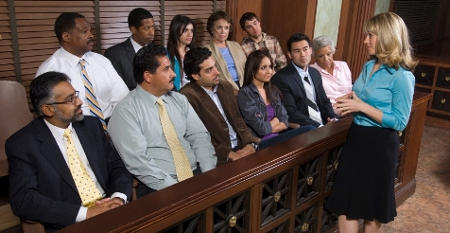A Pepper Grinder Post
Thomas on Trial
I have to say right up front that my wife and I have a thing about Thomas. We really like the guy. We both think he gets a bad rap. But, that being said, I want to try to look objectively at the facts. I want to compare how Thomas acted after Christ's resurrection with the reactions of the other disciples.
Lots of people act as though the only good thing about Thomas is that he is an example of how God can show grace, even to someone who stubbornly refuses to believe. But was he really that bad? How did he stack up against the other disciples? Let's look at the evidence. The story about Thomas after the resurrection is found in John 20:24-29.
Now Thomas (called Didymus), one of the Twelve, was not with the disciples when Jesus came. So the other disciples told him, "We have seen the Lord!" But he said to them, "Unless I see the nail marks in his hands and put my finger where the nails were, and put my hand into his side, I will not believe it."
A week later his disciples were in the house again, and Thomas was with them. Though the doors were locked, Jesus came and stood among them and said, "Peace be with you!" Then he said to Thomas, "Put your finger here; see my hands. Reach out your hand and put it into my side. Stop doubting and believe."
Thomas said to him, "My Lord and my God!"
Then Jesus told him, "Because you have seen me, you have believed; blessed are those who have not seen and yet have believed." (NIV)
Here are the charges brought against Thomas.
- He wasn't with the other disciples when Jesus showed up the first time. To hear someone I read recently tell it, this is the root of Thomas's problems. While the other disciples were hanging out in the upper room praying, Thomas had given up on this Jesus stuff and had gone off to work on his golf game. If he had not given up on "going to church," he would have seen and believed just like the other disciples.
- He didn't have true faith, but demanded physical evidence.
- Jesus himself rebukes Thomas by saying that those who have not seen and yet have believed are blessed.
 And what is the jury's verdict?
And what is the jury's verdict?
Whoa, wait a minute! Thomas's lawyer would like to say a word on his behalf.
Let's start by talking about Thomas not being with the other disciples. It is obviously true that Thomas was not with the other 10 disciples when Jesus appeared to them in the passage above, but it is also true that we have no idea why he wasn't there. It could be that he was on some errand for the group. It is certain that Thomas was not the only one who was not always with the other disciples between Christ's death and ascension. For example, in the account of the two disciples on the road to Emmaus in Luke 24, the disciples in question were not hanging around with the other disciples, but were (guess where?) on the road to Emmaus. As with Thomas, we have no clue what they were doing.
The other time we know for sure the disciples weren't all together was in John 21. This is the chapter after Jesus has appeared to Thomas and removed his doubts. Peter is hanging around with Thomas, Nathanael, and James and John (i.e. the sons of Zebedee). No word here about the whereabouts of the other disciples. Peter announces that he's going to hold a prayer meeting. Umm, wait, I don't think I got that quite right. He says he's going fishing! We can only hope it wasn't on a Sabbath morning. In spite of the fact that they all know for sure that Christ has risen from the dead, they all decide to go along. Jesus, rather than being shocked by their sacrilege, shows up at the end of a night of unproductive fishing, helps them get a huge catch, and has breakfast with them. Obviously, the idea that everyone except Thomas was hanging around together being super-spiritual is just wrong.
It's also obvious that Thomas hadn't turned his back on the disciples. True, he wasn't with them the first time Jesus appeared to them, but he was the second time. Why would he have gone back to hanging around with this group of people who, understandably, were afraid that the Jews or the Romans would be coming after them next unless he still considered himself one of them?
As for the second claim that Thomas himself said he would not believe without physical evidence, I think we need to try to put ourselves in the place of the disciples to understand what they might have felt at this moment. All the disciples were Jews. The time of Jesus, with the Jews being under the control of the Roman Empire, was a time of intense expectation of the Messiah. But here's the thing. No one expected the Messiah to come and die. They expected him to be the eternal King of Israel, with Israel taking a preeminent place among all kingdoms of the world. Try asking an Orthodox Jew today what they expect the Messiah to do when he comes to Earth. I don't think you'll find any who expect him to come to earth, never receive any political power, and then die a painful and humiliating death. Even when Jesus told the disciples explicitly that he was going to die and be raised from the dead, they couldn't really seem to grasp it, except for the time Peter had the temerity to rebuke Jesus for saying such a thing (more on this in a little).
 So here were the disciples. They'd been raised to long for the coming of the Messiah. Jesus comes along and they are convinced he is the one. They put the rest of their lives aside and spend all their time for three years following Jesus. Even when Jesus managed to offend almost all his followers by telling the people they must eat his flesh and drink his blood, the twelve disciples stuck with him (John 6:48-69). They had put all their eggs in one basket. Now, according to everything they had been taught, it had all come to nothing.
So here were the disciples. They'd been raised to long for the coming of the Messiah. Jesus comes along and they are convinced he is the one. They put the rest of their lives aside and spend all their time for three years following Jesus. Even when Jesus managed to offend almost all his followers by telling the people they must eat his flesh and drink his blood, the twelve disciples stuck with him (John 6:48-69). They had put all their eggs in one basket. Now, according to everything they had been taught, it had all come to nothing.
I think Jesus's encounter with the two disciples on the road to Emmaus in Luke 24 is extremely poignant. They had been talking about Jesus when the man himself (but whom they were kept from recognizing) comes up to them and asks them what they were talking about. In the words of Luke, "They stood still, their faces downcast." (24:17 NIV) These people had had their entire world shattered. They thought they had found the thing they wanted more than anything in the world, but now it seemed they had been deceived.
Imagine yourself as young and single. You believe you have found Mr. or Ms. Right. He or she is everything you had always dreamed of in a partner. Then, one day, you see him or her romantically embracing someone else, and your friends tell you that he or she was never serious about you. Now suppose that after several days of abject misery and no attempt to contact you on the part of your beloved, a friend comes and says, "Hey, I saw him, and he says he really does love you." How quick are you going to be to believe that? You have had your heart broken, and you feel like a fool. I think the position of the disciples was like that, only more so, because they were not just dealing with a romantic heartbreak, but a question that ties into God's concern for and salvation of their whole nation.
Okay, so we can sympathize with Thomas, but Jesus did rebuke him, right? Once again, Jesus's actual words to Thomas were, "Stop doubting and believe." Then after Thomas exclaims, "My Lord and my God!" Jesus responds, "Because you have seen me, you have believed; blessed are those who have not seen and yet have believed." If you think that's a harsh rebuke from Jesus, take a look at some of the things he said to the Pharisees and the teachers of the Law. Or, look at what he said to Peter when Peter rebuked Jesus for saying he was going to be killed:
Jesus turned and said to Peter, "Get behind me, Satan! You are a stumbling block to me; you do not have in mind the things of God, but the things of men." (Matthew 16:23 NIV)
Compared to that, what Jesus said to Thomas was quite gentle.
 Really, I think the core of why we look down on Thomas is that we think his reaction to the news of Christ's resurrection was much worse than that of the other disciples. But was it?
Really, I think the core of why we look down on Thomas is that we think his reaction to the news of Christ's resurrection was much worse than that of the other disciples. But was it?
In Luke's account, the first people to discover that Jesus was risen were women, who were taking spices to anoint Jesus's body. After they met angels, who told them Jesus was risen and reminded them of the words Jesus had said about this before, they rushed back to tell his disciples. Did the disciples break into songs of praise? According to Luke, "they did not believe the women, because their words seemed to them like nonsense." (Luke 24:11 NIV) The only slightly believing reaction these women got was from Peter, who rushed to the tomb to check things out for himself. In other words, none of the disciples believed when they were simply told that the resurrection had occurred--just like Thomas.
Some time later, when Jesus met the two disciples on the road to Emmaus, they confirmed that they had been told by the women that Jesus had risen and that investigation by Peter and others seemed to back this up, since the body was gone. Yet, it is very clear that they still believed Jesus was dead.
Now let's look a little later in Luke 24. The two disciples who had met Jesus while traveling to Emmaus rushed back to Jerusalem to tell the other disciples. When they get there, they hear that Jesus has also appeared to Peter. Now all doubts should be banished. In the midst of the excitement, Jesus himself shows up. But how did they react to this great event?
They were startled and frightened, thinking they saw a ghost.
He said to them, "Why are you troubled, and why do doubts rise in your minds? Look at my hands and my feet. It is I myself! Touch me and see; a ghost does not have flesh and bones, as you see I have."
When he had said this, he showed them his hands and feet. And while they still did not believe it because of joy and amazement, he asked them, "Do you have anything here to eat?"
They gave him a piece of broiled fish, and he took it and ate it in their presence. (Luke 24:37-43 NIV)
He invites them to touch him, just as he invited Thomas. Thomas, however, immediately responded, "My Lord and my God!" The main group of disciples seems to take more convincing than Thomas did, since we read that they still didn't believe it because of joy and amazement. Jesus eats a piece of fish to prove to them that he is real and not a ghost.
 It seems clear to me that Thomas did as well or better than the other disciples in terms of believing the resurrection. Sometimes I wonder if the willingness of modern Christians to look down on Thomas comes from a kind of pride. Jesus said, "blessed are those who have not seen and yet have believed." (John 20:29 NIV) I think it makes us happy to think of ourselves as those blessed ones who didn't see and yet believed. While it's true that Christians since those first disciples have believed without seeing, I hope we can all see how different the situation was for them.
It seems clear to me that Thomas did as well or better than the other disciples in terms of believing the resurrection. Sometimes I wonder if the willingness of modern Christians to look down on Thomas comes from a kind of pride. Jesus said, "blessed are those who have not seen and yet have believed." (John 20:29 NIV) I think it makes us happy to think of ourselves as those blessed ones who didn't see and yet believed. While it's true that Christians since those first disciples have believed without seeing, I hope we can all see how different the situation was for them.
I do believe that the story of Thomas illustrates God's incredible grace and kindness to us. The thing is, the Bible is packed with stories that show that. Over and over, God extended mercy to people who would have no hope apart from it. Every single person from Adam and Eve on has been incapable of believing without God's undeserved favor. He gave it to Thomas. He gives it to us. Praise the Lord.
- Pepper
Posted 2016-07-17
*Photo credits: Gavel from Unlocking the Gold; Jury from Lakewood, CO website
